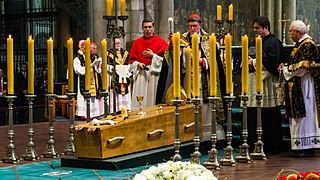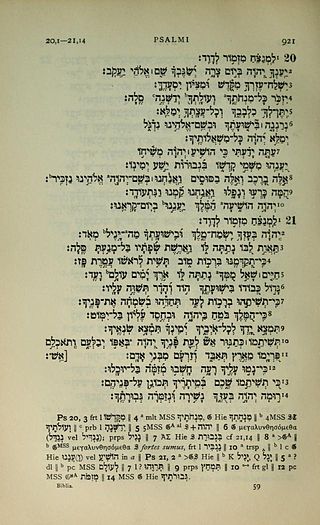Related Research Articles
The Hittites, also spelled Hethites, were a group of people mentioned in the Hebrew Bible. Under the names בני-חת and חתי they are described several times as living in or near Canaan between the time of Abraham and the time of Ezra after the return of the Jews from the Babylonian exile. Their ancestor was Heth.

Consecration is the transfer of a person or a thing to the sacred sphere for a special purpose or service. The word consecration literally means "association with the sacred". Persons, places, or things can be consecrated, and the term is used in various ways by different groups. The origin of the word comes from the Latin stem consecrat, which means dedicated, devoted, and sacred. A synonym for consecration is sanctification; its antonym is desecration.

Absolution is a theological term for the forgiveness imparted by ordained Christian priests and experienced by Christian penitents. It is a universal feature of the historic churches of Christendom, although the theology and the practice of absolution vary between Christian denominations.

Psalm 89 is the 89th psalm of the Book of Psalms, beginning in English in the King James Version: "I will sing of the mercies of the LORD for ever". In the slightly different numbering system used in the Greek Septuagint and Latin Vulgate translations of the Bible, this psalm is Psalm 88. In Latin, it is known as "Misericordias Domini in aeternum cantabo". It is described as a maschil or "contemplation".

A grace is a short prayer or thankful phrase said before or after eating. The term most commonly refers to Christian traditions. Some traditions hold that grace and thanksgiving imparts a blessing which sanctifies the meal. In English, reciting such a prayer is sometimes referred to as "saying grace". The term comes from the Ecclesiastical Latin phrase gratiarum actio, "act of thanks." Theologically, the act of saying grace is derived from the Bible, in which Jesus and Saint Paul pray before meals. The practice reflects the belief that humans should thank God who is the origin of everything.

Psalm 74 is the 74th psalm of the Book of Psalms, beginning in English in the King James Version: "O God, why hast thou cast us off for ever?". In the slightly different numbering system used in the Greek Septuagint and Latin Vulgate translations of the Bible, this psalm is Psalm 73. In Latin, it is known as "Ut quid Deus reppulisti in finem iratus". Subheaded a maschil or contemplation, and a community lament, it expresses the pleas of the Jewish community in the Babylonian captivity. It is attributed to Asaph.
The usual beginning is the series of prayers with which most divine services begin in the Eastern Orthodox Church and those Eastern Catholic Churches which follow the Byzantine Rite.
Banishment or exile can be a form of punishment. It means to be away from one's home while either being explicitly refused permission to return and/or being threatened by prison or death upon return. It is a common theme within the Bible, beginning with Adam and Eve. Below is a partial list of these exiles as referenced in the Bible.

Absolution of the dead is a prayer for or a declaration of absolution of a dead person's sins that takes place at the person's religious funeral.

Psalm 17 is the 17th psalm of the Book of Psalms, beginning in English in the King James Version: "Hear the right, O LORD, attend unto my cry". In the Greek Septuagint and the Latin Vulgate, it is psalm 16 in a slightly different numbering system, "Exaudi Domine iustitiam meam". Its authorship is traditionally assigned to King David.

Psalm 21 is the 21st psalm of the Book of Psalms, beginning in English in the King James Version: "The king shall joy in thy strength". The Book of Psalms is part of the third section of the Hebrew Bible, and a book of the Christian Old Testament. In the slightly different numbering system used in the Greek Septuagint and Latin Vulgate translations of the Bible, this psalm is Psalm 20. In Latin, it is known by the incipit, "Domine in virtute tua". The psalm is attributed to David.

Psalm 50, a Psalm of Asaph, is the 50th psalm from the Book of Psalms in the Bible, beginning in English in the King James Version: "The mighty God, even the LORD, hath spoken, and called the earth from the rising of the sun unto the going down thereof." In the slightly different numbering system used in the Greek Septuagint and Latin Vulgate translations of the Bible, this psalm is Psalm 49. The opening words in Latin are Deus deorum, Dominus, locutus est / et vocavit terram a solis ortu usque ad occasum. The psalm is a prophetic imagining of God's judgment on the Israelites.

Psalm 66 is the 66th psalm of the Book of Psalms, beginning in English in the King James Version: "Make a joyful noise unto God, all ye lands". In the slightly different numbering system of the Greek Septuagint version of the Bible and the Latin Vulgate, this psalm is Psalm 65. In Latin, it is known as "Iubilate Deo omnis terra". It is a psalm of thanksgiving probably intended for use at the Passover. The psalm is divided into two parts: in verses 1-12 the community praises God and invites the whole world to join in praise; in verses 13–20, "an individual from the rescued community fulfils a vow to offer a sacrifice of thanksgiving".

Psalm 71 is the 71st psalm of the Book of Psalms, beginning in English in the King James Version: "In thee, O LORD, do I put my trust: let me never be put to confusion". It has no title in the Hebrew version. In the slightly different numbering system used in the Greek Septuagint and Latin Vulgate translations of the Bible, this psalm is Psalm 70. In Latin, it is known as "In te Domine speravi".

Psalm 85 is the 85th psalm of the Book of Psalms, one of a series of psalms attributed to the sons of Korah. In the English of the King James Version, this psalm begins: "LORD, thou hast been favourable unto thy land". In the slightly different numbering system used in the Greek Septuagint and Latin Vulgate translations of the Bible, this psalm is Psalm 84. In Latin, it is known as "Benedixisti Domine terram tuam". In Judaism, it is called "a psalm of returned exiles". The Jerusalem Bible describes it as a "prayer for peace".
Psalm 86 is the 86th psalm of the Book of Psalms, beginning in English in the King James Version: "Bow down thine ear, O Lord, hear me: for I am poor and needy". In the slightly different numbering system used in the Greek Septuagint and Latin Vulgate translations of the Bible, this psalm is Psalm 85. In Latin, it is known as "Inclina Domine". It is attributed to David.

Psalm 88 is the 88th psalm of the Book of Psalms, beginning in English in the King James Version: "O LORD God of my salvation, I have cried day and night before thee". In the slightly different numbering system used in the Greek Septuagint and Latin Vulgate translations of the Bible, this psalm is Psalm 87. In Latin, it is known as "Domine Deus salutis meae". According to the title, it is a "psalm of the sons of Korah" as well as a "maskil of Heman the Ezrahite".

Psalm 102 is the 102nd psalm of the Book of Psalms, beginning in English in the King James Version: "Hear my prayer, O LORD, and let my cry come unto thee." In Latin, it is known as "Domine exaudi orationem meam".
Kumayl bin Ziyad an-Nakha'i was among the most loyal companions of Imam Ali Ibn Abi Talib. Moreover, Kumayl occupies a prominent position in Shia Islam. Converting to Islam during the time of Islamic prophet Muhammad, he rose to a position of prominence during the caliphates of Uthman and Ali. In the caliphate of Ali, Kumayl flourished and served him in the most disciplined of ways. However, he is recognized for his pious and humble nature as well as preserving Imam Ali's teachings. Kumayl is best known for the du'a (supplication) of Prophet Khidr, which is commonly known by the name du'a Kumayl.
The Begatting of the President is a satirical album narrated by Orson Welles, summarising the presidency of Lyndon B. Johnson and the election of 1968, leading up to the election of Richard Nixon, delivered in the style of Biblical verse.
References
- ↑ Barnes, A., Barnes' Notes on the Bible on 1 Kings 8, accessed 6 October 2017

- ↑ A Latin version from Jerome's Latin Vulgate (405 A.D.) is available at Ecclesiasticus 52 (Vulgate)
- ↑ The Prayer of Solomon in the Gutenberg Bible can be viewed at the following website: Gutenberg Bible: Prayer of Solomon.